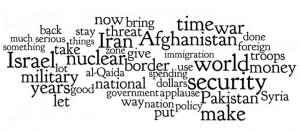Where is GOP fiscal responsibility on the Afghanistan War?
Mary Kaszynski
Afghanistan Study Group Blogger
Last night’s foreign policy debate saw little in the way of surprises. The Republican presidential candidates postured on Iran and Israel, argued immigration laws, and even discussed racial profiling. Substantive discussion of Afghanistan, however, was again in short order.
Of course, there’s more to evaluating a debate than just counting the words. Was the Afghanistan discussion, short as it was, substantive and insightful? Unfortunately, the answer is no.
The highlight of the Afghanistan discussion was, as expected, Jon Huntsman’s remarks. Huntsman again called for ending the war:
We need an honest conversation in this country about the sacrifices that have been made over nearly 10 years. We have dismantled the Taliban. We’ve run them out of Kabul. We’ve had free elections in 2004. We’ve killed Osama bin Laden. We’ve up-ended, dismantled al-Qaida. We have achieved some very important goals for the United States of America.
Now, the fact that we have 100,000 troops nation-building in Afghanistan when this nation so desperately needs to be built, when on the ground we do need intelligence gathering, no doubt about that, we need a strong special-forces presence, we need a drone presence and we need some going training of the Afghan National Army, but we haven’t done a very good job defining and articulating what the end point is in Afghanistan. I think the American people are getting very tired about where we find ourselves today.” [emphasis added]
Once again, Huntsman has shown that he is the only candidate who recognizes the importance of identifying threats, and developing a strategy to meet those threats. Romney’s response shows how far he and the other candidates are from a real strategy, preferring instead to rely on military force as the answer to every problem.
“The decision to pull our troops out before [2014]…would put at risk the extraordinary investment of treasure and blood which has been sacrificed by the American military…This is not time for America to cut and run. We have been in for 10 years. We are winding down. The Afghan troops are picking up the capacity to secure their country. And the mission is pretty straightforward, and that is to allow the Afghan people to have a sovereign nation not taken over by the Taliban.”
There are two glaring errors in Romney’s remarks. First, he mischaracterizes the drawdown plan. “Withdraw troops” is not equivalent to “cut and run.” Huntsman does not advocate abandoning Afghanistan – he simply says that US troops can’t solve the problems that Afghanistan faces.
Romney’s second problem is in focusing exclusively on security concerns. The goal, according to Romney, is to deny the Taliban safe haven, and the solution is to build the Afghan security forces. He is forgetting that there are far more problems than just security threats.
Take the economy, for example. The World Bank estimates that foreign aid accounts for 92% of Afghanistan’s public spending, and that Afghanistan is therefore likely to need billions in aid for years to come. Another key problem is education. Illiteracy is a major impediment to training the Afghan security forces.
Bottom line: Unless Romney and others who want to keep troops in Afghanistan are suggesting that our troops somehow improve the Afghan economy and education system, they’re going to have to come up with a better plan. Maybe they should be taking notes from Jon Huntsman.


